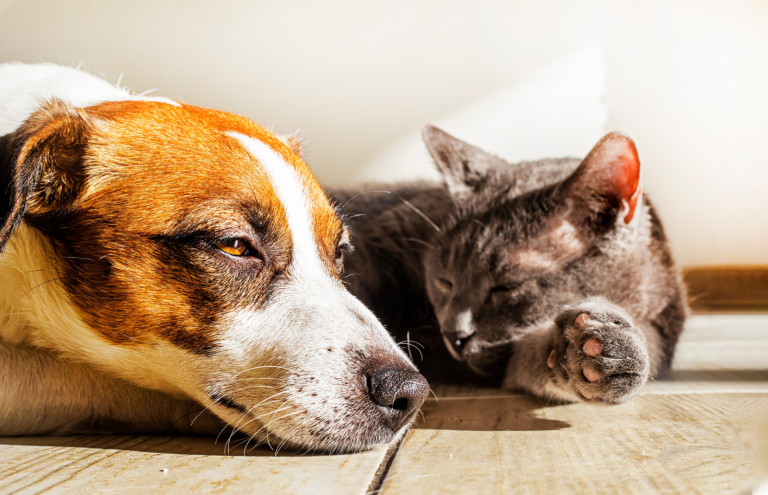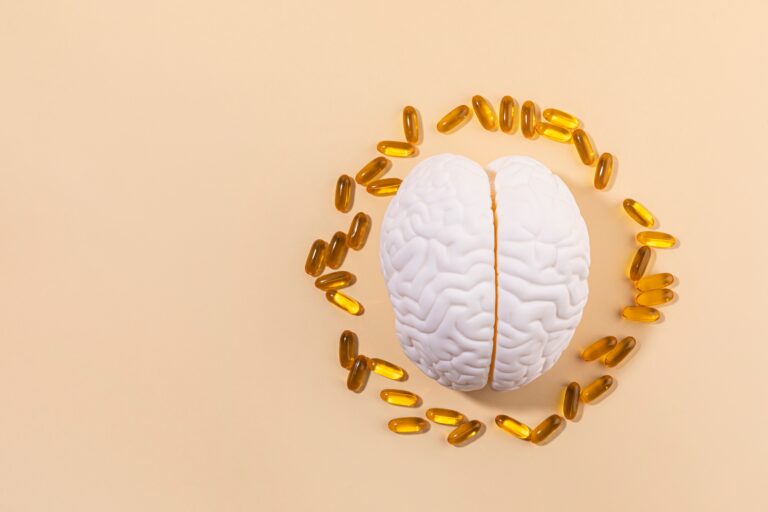Digestive Health in Cats and Dogs
Digestion in Dogs and Cats
A healthy digestive system is crucial to wellness in humans, as well as in cats and dogs. Daily habits, dietary factors, ingestion of foreign bodies, antibiotic use, and many other external factors can impact the health of the digestive system.
Digestion involves complex interactions and coordination between several tissues including the mouth, stomach, small intestine, gallbladder, and autonomic nervous system. Additionally, the structure of the digestive system significantly enhances its efficiency in absorbing nutrients. The presence of mucosal folds, villi, and microvilli increase the surface area of the gastrointestinal (GI) tract by over 600-fold, allowing for significantly enhanced absorption of nutrients.
In addition to absorbing nutrients from the diet, the digestive system also plays a role in fluid balance, controlling the amount of fluid that comes in and goes out, transports electrolytes into circulation, and recycles and reabsorbs essential nutrients. It also has a very important role in immune function.
Approximately 70 percent of immune-secreting cells are located along the GI tract. Because the digestive system is routinely exposed to a large number of foreign materials, this GI-immune interaction allows for an immune response that differentiates between pathogenic antigens and substances that are considered safe, like nutrients.
Consequences of Digestive Dysfunction
Digestive health can decline for several reasons, and there are significant consequences for dogs and cats. Conditions that stem from the dysfunction in the digestive system include food hypersensitivity, leaky gut syndrome, inflammatory conditions, and autoimmune diseases. One study found that the five most common digestive problems in dogs were:
- Vomiting
- Diarrhea
- Concurrent vomiting with diarrhea
- Anorexia
- Constipation
Age had a significant effect on the occurrence of digestive diseases with puppies under six months of age being more prone to diarrhea than dogs of other ages. The dog’s sex and breed can also influence the prevalence of various digestive disorders.1
Issues within the digestive tract can arise from several areas, including damaged intestinal mucosa, quality and quantity of salivary, gastric, biliary, and pancreatic secretions, intestinal motility, and diet and water quality. Because problems can arise from multiple pathways, evaluating and identifying the problems in this complex system can be challenging. Interventions seeking to correct GI issues must consider its dynamic nature and attempt to normalize all functions of the GI system in addition to addressing specific dysfunction that originally produced the symptoms.
Microbiome and Immune Function
Dogs and cats have different nutritional requirements which dictate the composition and role of the microbiome in each.2 The term microbiome refers to the genetic material of all microorganisms living in a defined habitat – in this case the digestive tract.2 The composition of the gut microbiome varies across the GI tract due to variations in pH, oxygen, and the nutrient gradient as food travels down the intestines.2
Cats typically require higher protein content and less glucose in their food while dogs tend to be more omnivorous and can digest, absorb, and utilize relatively high amounts of carbohydrates.2 While the composition of the microbiome is similar between cats and dogs, they differ in the abundance of specific bacterial phyla and in the diversity of species, with cats displaying higher diversity.2 The microbiome also varies within each species according to breed, diet, age, and environment.2
The gut microbiome has several important functions including facilitating the breakdown of food and producing short chain fatty acids (SCFAs), secondary bile acids, vitamins, and nutrients; it also influences many aspects of health including fitness, physiology, behavior, and reproduction.2,3 It also influences the development and regulation of bodily systems including the nervous, renal, digestive, endocrine, immune, and respiratory systems.2 The diet can positively or negatively affect the microbiome, which then affects the immune system, which in turn influences the quality and health of the microbiome and host, creating a cycle that can be either beneficial or harmful.2
The microbiome is necessary for the maturation and development of a functional intestinal immune response, and it must be carefully balanced to attack pathogens – but not its host or beneficial dietary components.4 A balanced microbiome primes and stimulates the immune system, aids in defense against intestinal pathogens, and provides nutrition benefits to the host.3-5 Beneficial bacteria can compete for oxygen, nutrients, and mucosal adhesion sites, preventing pathogenic bacteria from gaining access.2,3,5 They can also create a physiologically restrictive environment for nonresident bacteria and viruses by secreting antimicrobials, altering the pH, and producing hydrogen sulfide.5 Because the microbiome is not fully formed in young puppies and kittens, they may suffer more from invading pathogens and digestive issues which will likely resolve with age.5
Good bacteria in the gut are important in regulating immune components including T cells, dendritic cells, and toll-like receptors, modulating cytokine levels, and suppressing inflammation.3,4 Proper nutrition also supports the microbiome by feeding the resident bacteria. The bacteria can metabolize dietary components into SCFAs and bile acids, which have anti-inflammatory properties under healthy conditions and are found at higher levels in healthy dogs compared to unhealthy ones.3 When abnormal conditions arise, these same nutrients can contribute to detrimental symptoms due to the role of SCFA and bile acids in mediating inflammation.3
Dysbiosis in the microbiome is defined as any change in the composition of microbiome communities compared to that found in healthy individuals.3,4 The three types of common dysbiosis are:
- Loss of beneficial organisms
- Expansion of potentially harmful microorganisms
- Decrease in overall diversity
When diversity decreases, there is an opportunity for harmful species to increase and form a stable colony. This imbalance leads to an increase in intestinal permeability through gaps in tight junctions, damaged epithelial cells, and depleted chemical barrier secretions. Bacteria are consequently able to translocate to other areas, causing the immune system to respond to the constant threats.3,6 Disturbances in the gut microbiota have been associated with increased metabolic and immune disorders in animals due to the molecular interactions that connect the gut microbiome to the host through energy metabolism, lipid accumulation, and immunity.7
Dysbiosis in both dogs and cats can be either acute or chronic.3 It may also be a secondary effect to a different underlying disease which is important to identify to accurately treat the animal.3 Conditions that can lead to dysbiosis in dogs and cats include ingestion of foreign bodies, motility issues due to hypothyroidism, chronic enteropathies, antibiotic use or over-use, and diets that are high in fat and protein and low in fiber.3 Additionally, young dogs and cats that have not had the time to build up their gut microbiome colonies are more susceptible to invading pathogens.5
Prebiotics, Probiotics, and Immune Function
The intestinal microbiome can be influenced by dietary factors, prebiotics, and probiotics, as well as fecal microbiome transfers.2,3 Diet, prebiotics, and probiotics are accessible avenues for pet owners to intervene, and interventions can provide good results. Prebiotics are indigestible carbohydrates that are used selectively by organisms in the microbiome, providing energy and nutrients to the bacteria but not the host.3
They typically have a beneficial effect on the health of the host because they feed good bacteria, and their fermentation can produce more SCFAs which help to maintain the intestinal barrier, are anti-inflammatory, and regulate motility.3 If the prebiotic is a form of fiber, it can also bind harmful bacterial metabolites, leading to their excretion.3
Probiotics are living organisms that can colonize the GI tract and provide benefits to the host.3 Targeting strains that are specifically depleted can help bring levels back to healthy levels by improving gut barrier function, modulating immune function, and working as antimicrobial agents.3,5,6
When a specific probiotic (Enterococcus faecium SF68) was given to puppies at weaning, they demonstrated higher serum antibody concentrations, a stronger response to distemper vaccination, and a greater proportion of mature B cells one year later.8
Probiotics are typically well tolerated, but it is often not possible to know exactly which strains are most needed.3 A general probiotic can promote normalization of the gut microbiome by providing beneficial bacteria while specific strains can target potentially depleted populations to restore function.
Postbiotics and Other Considerations
Postbiotics are non-viable bacterial products or metabolic byproducts from probiotic microorganisms that have biological activity in the host and provide benefits.9 They include complex mixtures of metabolic products or secreted components of microorganisms such as enzymes, proteins, SCFAs, vitamins, amino acids, peptides, surface proteins, and organic acids.9
Specifically, SCFAs exert several beneficial effects including modulating the immune system, regulating GI motility, and exhibiting antidiarrheic effects.10 Additionally, healthy dogs demonstrate higher SCFA concentrations than dogs with chronic enteropathy.10 Beneficial postbiotics include:2,3
- Acetate: increases satiety and is a substrate for hepatic lipogenesis
- Propionate: increases satiety and is a substrate for hepatic gluconeogenesis
- Butyrate: energy substrate for colonocytes, promotes colon electrolyte balance, motility, and blood flow, and involved in epigenetic modulation
- Indole and indole-3-propionate: Increases epithelial cell tight-junction formation and gut barrier integrity, decreases markers of inflammation, improves host-microbiome immune homeostasis
- Polyamines: Maintains intestinal barrier function
- Isobutyrate: Source of rapid energy for colonocytes
Examples of postbiotics that can be harmful include hydrogen sulfide, which is associated with ulcerative colitis and uremic toxins that are pro-inflammatory and exacerbate kidney function decline.2
Other dietary components that may help maintain digestive health in dogs and cat include:
- L-glutamine: primary energy source for enterocytes, maintains intestinal lining including villi, helps to heal gut lining in patients with GI disorders and malabsorption, and can help boost immune cell activity in the gut
- Bile salts: help support liver and gallbladder to aid in digestion and absorption of fat and help support motility, an important function in bowel health
- Pancreatic extracts: improves pancreatic cell biochemistry and enhances its ability to respond to demands
- Chlorophyll and alfalfa juice: supports detoxification and fecal excretion through bile acids
- Wheat germ oil: source of vitamin E, a potent antioxidant, and plays a role in tissue healing
The gut microbiome is a functionally metabolic organ in the body. It significantly affects host metabolism and physiology, including modulating immune homeostasis. Disturbances can contribute to or exacerbate an illness but nutritional interventions that optimize the composition and function of the microbiome can improve the health of both cats and dogs and support their overall digestive health.
- Rakha, G.M.H., Abdl-Haleem, M.M., Farghali, H.A.M., Abdel-Saeed. (2015). Prevalence of common canine digestive problems compared with other health problems in teaching veterinary hospital, Faculty of Veterinary Medicine, Cairo University, Egypt. Vet World, 8(3):403-411.
- Wernimont, S.M., Radosevich, J., Jackson, M.I., Ephraim, E., Badri, D.V., MacLeay, J.M., Jewell, D.E., Suchdolski, J.S. (2020). The Effects of Nutrition on the Gastrointestinal Microbiome of Cats and Dogs: Impact on Health and Disease. Front Microbiol, 11:1266-1289.
- Ziese, A.L., Suchodolski, J.S. (2021). Impact of Changes in Gastrointestinal Microbiota in Canine and Feline Digestive Diseases. Vet Clin N Am-Small, 51:155-169.
- Petersen, C., Round, J.L. (2014). Defining dysbiosis and its influence on host immunity and disease. Cell Microbiol, 16(7):1024-1033.
- Suchodolski, J.S. (2014). Companion animals symposium: microbes and gastrointestinal health of dogs and cats. J Anim Sci, 89:1520-1530.
- Brown, K., DeCoffe, D., Molcan, E., Gibson, D.L. (2012). Diet-induced dysbiosis of the intestinal microbiota and the effects on immunity and disease. Nutrients, 4:1095-1119.
- Boulangé, C.L., Neves, A.L., Chilloux, J., Nicholson, J.K., Dumas, M. (2016). Impact of the gut microbiota on inflammation, obesity, and metabolic disease. Genome Med, 8(1):42-53.
- Benyacoub, J., Czarnecki-Maulden, G.L., Cavadini, C., Sauthier, T., Anderson, R.E., Schiffrin, E.J., von der Weid, T. (2003). Supplementation of food with Enterococcus faecium (SF68) stimulates immune functions in young dogs. J Nutr, 133:1158–1162.
- Nataraj, B.H., Ali, S.A., Behare, P.V., Yadav, H. (2020). Postbiotics-parabiotics: the new horizons in microbial biotherapy and functional foods. Microb Cell Fact, 19(1):168-189.
- Minamoto, Y., Minamoto, T., Isaiah, A., Sattasathuchana, P., Buono, A., Rangachari, V.R., McNeely, I.H., Lidbury, J., Steiner, J.M., Suchodolski, J.S. (2019). Fecal short-chain fatty acid concentrations and dysbiosis in dogs with chronic enteropathy. J Vet Intern Med, 33(4):1608-1618.







